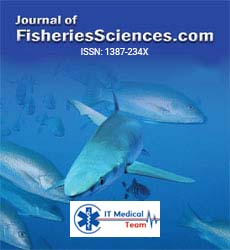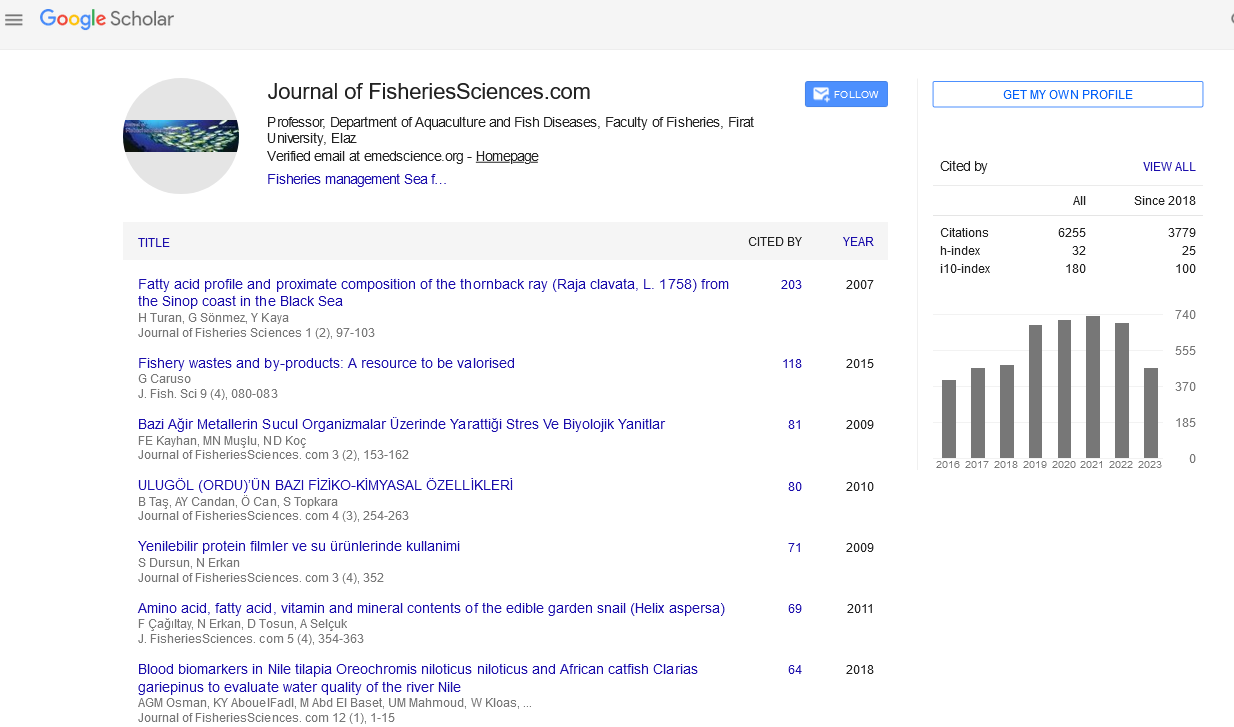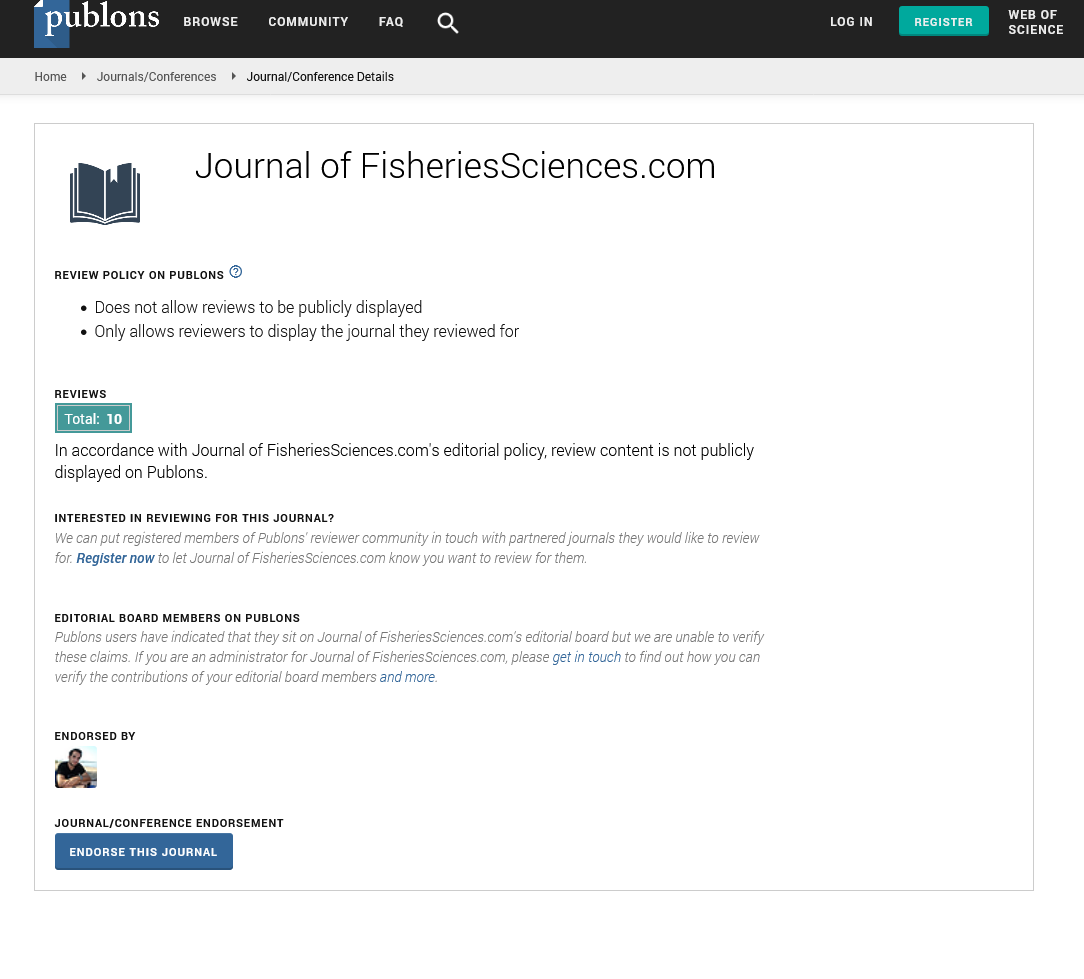Commentary Article - (2022) Volume 16, Issue 12
Roles of Independent Inland Fisheries
Wenna Will Thomas*
Department of Zoological Sciences, Addis Ababa University, Ethiopia
*Correspondence:
Wenna Will Thomas, Department of Zoological Sciences, Addis Ababa University,
Ethiopia,
Email:
Received: 02-Dec-2022, Manuscript No. IPFS-21-9409;
Editor assigned: 05-Dec-2022, Pre QC No. IPFS-21-9409 (PQ);
Reviewed: 19-Dec-2022, QC No. IPFS-21-9409;
Revised: 24-Dec-2022, Manuscript No. IPFS-21-9409 (R);
Published:
31-Dec-2022, DOI: 10.36648/1307-234X.22.16.118
Abstract
The independent Inland fisheries produce food for billions and maintenance for millions of people worldwide Inland fisheries come up with important to food certainty and economic certainty by providing primary sources of the animal protein validity nutrients, and the earning. Small-scale fisheries and aquaculture make analytical contributions to the development in areas of employment, with over 41 million individuals worldwide, the vast most of whom live in the progress countries, working in fish manufacture, food security, and nourishment, with fish constituting a principal source. Inland fish and fisheries supply cultural and refreshment services and contributions to human fitness and well-being. They empower those complicated in the sector, come up with to green food action and provide a means for knowledge transfer and capacity building across political jurisdictions. Fish have formed an important item of the person's diet. Nearly all the fish pond and marine are consumable and have been an important starting point of protein, fat, and vitamins A and D since time ancient. In most fishes, the tissue is white, contains about 13 to 20% of the enzyme, and has a food worth of 300 to 1600 calories per sovereign.
Introduction
The fishery is the undertaking of raising or undertaking fish and additional aquatic life. Trading fisheries include wild fisheries and fish plantations, both in fresh water and the oceans [1]. About 500 million people worldwide are financially dependent on fisheries. Because of their economic and social critical the fisheries are controlled by complex fishery management practices and legal regimes, that vary widely across countries. Confirmed, fisheries were treated with a first-come first-serve speak to; however threats by human siltation and environmental issues have required increased ruling of fisheries to prevent showing and increase profitable economic undertaking on the fishery. Modern control over fisheries is often established by a mix of worldwide treaties and local laws [2]. The precision often includes a combination of the creature and fish fishers in a region, the latter fishing for similar types with similar gear types [3]. Some government and private corporations especially those focusing on relaxation fishing include in their definitions not only the fishers but the fish and domain upon which the fish depend.
REFERENCES
Google Scholar, Crossref, Indexed at
Google Scholar, Crossref, Indexed at
Google Scholar, Crossref, Indexed at
Google Scholar, Crossref, Indexed at
Google Scholar, Crossref
Google Scholar, Crossref, Indexed at
- Costello Christopher, Gaines Steven D, Lynham John (2008) Can Catch Shares Prevent Fisheries Collapse? Science 321 (5896): 1678-1681.
- Shertzer Kyle W, Prager Michael H (2007) Delay in fishery management: diminished yield, longer rebuilding, and increased probability of stock collapse1. ICES J Mar Sci 64 (1): 149-159.
- Thorpe Robert B, Jennings Simon, Dolder Paul, J Zhou Shijie (2017) Risks and benefits of catching pretty good yield in multispecies mixed fisheries. ICES J Mar Sci 74 (8): 2097-2106.
- Hilborn R (2007) Managing fisheries is managing people: what has been learned? Fish and Fisheries 8 (4): 285-296.
- Jentoft Svein (2004) Fisheries co-management as empowerment. Marine Policy 29: 1-7.
- Tacconi Luca, Williams David Aled (2020). Corruption and Anti-Corruption in Environmental and Resource Management. Annu Rev Environ Resour 45: 305-329.
Citation: Thomas WW (2021) Roles of Fishery in the Society. J Fish Sci, Vol.16 No. 11: 95.






